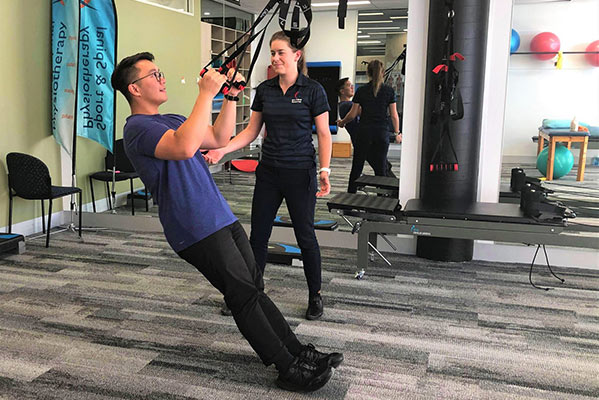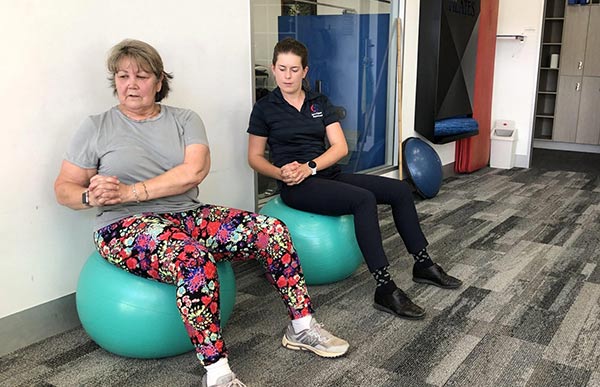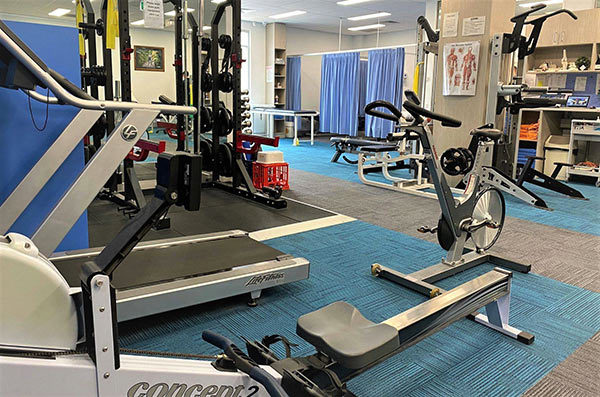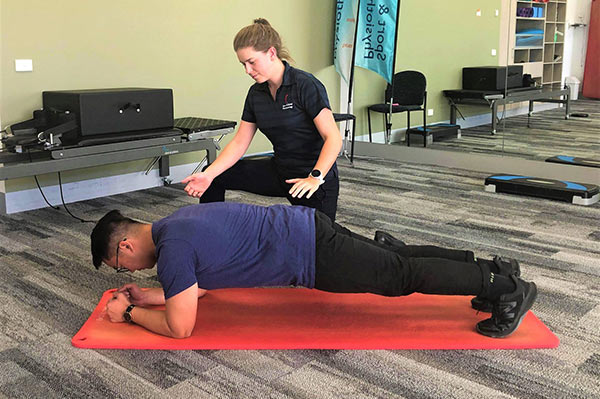What is an Exercise Physiologist?
What is an Exercise Physiologist?
An Exercise Physiologist is an allied health professional who has expertise in using evidence-based and clinical exercise interventions to treat your injury or condition. Exercise Physiologists (EP’s) complete a four year university degree and specialise in the human body. In particular, EP’s focus on the benefit of exercise on the body, both mentally and physically.
EP’s often work closely with other allied health practitioners like physiotherapists, podiatrists, dieticians and psychologists. They work together to create an ideal treatment plan to get you back to your best self. For example, the EP continues to work with you to continue with strength and conditioning once the physio has completed the initial rehabilitation of an injury. An EP will also work closely with Dieticians for clients with diabetes to ensure optimal benefit to a balanced exercise and diet approach.
What’s the difference between an Exercise Physiologist and a Physiotherapist?
Both EP’s and Physios have a large role to play in improving client’s health outcomes. However, there are differences between them. Physiotherapists are trained and qualified to diagnose and assess diseases or disability of the body. They also use hands on treatment methods such as manual therapy and massage. Often they see more acute injuries or disabilities that need immediate attention. EP’s will then see clients when the physio is happy with the progress of their injury rehabilitation, or if a client requires a specific exercise program. Such an exercise program will be more focussed on improving a client’s overall strength and conditioning as well as body wellness.
If you’re still not sure of the difference or how physios and EPs can work together to get an injury back in shape, here is an example of the treatment journey:
A client’s treatment journey from Physio to EP
You attend Sport & Spinal Physiotherapy after recently rolling your ankle at soccer and want to get back on the pitch as quick as possible. It is best to see one of our highly trained physiotherapists initially, who will assess and determine a diagnosis. Unfortunately you have sustained a high ankle sprain (syndesmosis) and are required to be on crutches for 2 weeks non-weight bearing.
Your physio will also do acute treatment like strapping, manual therapy and management, and give you exercises to complete so as to restore your normal range of motion and function. Subsequently, after a review session, our physio will determine your ankle is ready to return to sport. Unfortunately, your whole lower limb has wasted or become weaker because of the immobility from the injury. You will be referred to our Exercise Physiologist to design an overall strength program which can be easily implemented for a safe and effective return to soccer.
Our EP will also assess for other conditions like diabetes, mental health, neurological disorders etc or perhaps how you got the injury in the first place. Your EP will then continue to progress and modify the exercises in your program depending on the progress of your injury rehabilitation. Other strength or stretch exercises will be given to get your body strong and avoid further injury when you return to soccer. Our goal is to get you physically back to where you were before you sustained the ankle injury and to prevent further injury.
In summary…
Basically, a physio will enable your ankle to be ready for sport again whereas an EP will take a more holistic approach and make sure your whole body is ready to return to sport and beyond.
Once again, our EP will look at the whole picture for any musculoskeletal issues as well as any co-existing conditions to restore optimal overall function and body wellness. Whereas a physio will only look at any musculoskeletal conditions to return a particular injury back to full function.
What conditions does an Exercise Physiologist work with?
EP’s focus on treating many types of injuries or conditions. These conditions can range from acute, sub-acute or chronic medical conditions, injuries and disabilities. Examples can include:
- Cardiovascular (Heart Disease, Stroke, Hypertension)
- Metabolic (overweight or obesity, Diabetes type 1 and 2, Sleep Apnoea)
- Musculoskeletal injuries or rehabilitation (Osteoarthritis, Rheumatoid Arthritis, Osteoporosis, physical injuries or conditions).
- Neurological (Stroke, Spinal Cord Injury, Parkinson’s disease, Multiple Sclerosis, dementia, Traumatic Brain Injury)
- Cancers (Breast Cancer, Prostate Cancer or Bowel Cancer)
- Kidney Disease
- Respiratory and Pulmonary (Asthma, COPD, Cystic Fibrosis)
- Mental Health (anxiety disorders, affective disorders, psychotic disorders and trauma, and stressors related disorders)
- Developmental Delays (Autism Spectrum Disorders, Cerebral Palsy, Down Syndrome)
- and any other conditions for which there is evidence that exercise can improve the client’s clinical status
Common conditions treated range from muscular or tendon injuries, lower back pain, Osteoarthritis, Diabetes mellitus (type 1 and 2), COPD, Heart disease, Cancers or rehabilitation from cancer treatments or surgeries, and so many more!
Exercise Physiology and Mental Health
EP’s also work with a range of mental health conditions such as PTSD, depression and anxiety, dementia and schizophrenia. Commonly, our EP’s work with children for conditions like ADHD, Autism, Cerebral Palsy or learning disorders. These conditions benefit from exercise programs that improve the general strengthening of low muscle tone. EP’s often work on creating a safe and engaging environment for these clients. Additional benefits of such programs include social interaction, overall health benefits and improvements in mental health.
Weight loss and weight management is a particular focus of our Exercise Physiologists at Sport & Spinal Physiotherapy. Our EP’s regularly collaborate with our dietitian in the clinic. Therefore, our EP’s can develop suitable and individualised lifestyle and weight loss program for each client.
How can an Exercise Physiologist help me?
Our EP’s will work closely with you to devise a home or gym program depending on your condition or injury. Your individualised program will focus on daily or weekly exercise sessions and goals. Regular appointments with your EP will ensure continued correct technique and understanding of the program.
At Sport & Spinal Physiotherapy we also deliver in-house exercise sessions which are tailored to your conditions and goals. Exercise Physiology programs will focus on strength, flexibility, cardiovascular fitness, rehabilitation and/or movement patterns.
In addition, our EP’s can review your current training load, exercise programs, cross training for sport or lifestyle activities. Our EP’s can correct techniques to ensure you are able to maximise your workouts or lifestyle activities. Workouts and home, fitness centres, swimming pools, gyms or on the sporting field can be addressed.
Your first EP consult
At your first consult, our EP’s will go through any relevant injury or condition history. EP’s will also discuss goals, current lifestyle activities, stresses and general health screening. EP’s will use various assessments which may be physical measures of strength and balance, specific to your goals. Finally, a program with specific exercises will be developed for you. Your EP will discuss your daily or weekly routine and assist you in working towards achieving realistic goals to improve your overall health and lifestyle.
What type of organisations do we work with?
DVA Health Cards (Gold and white) are accepted as payment upon a GP referral – Treatment usually includes rehabilitation and general lifestyle education, mental health and social interaction. The client will need a D904 referral by their usual treating doctor. We will provide your doctor with a A 12th session assessment report and update them on your progress.
Medicare – Treatment will involve discussion of current exercise and general lifestyle education, weight loss techniques and conditions or injury rehabilitation. Your doctor can approve up to 5 sessions covered under Medicare through an EPC referral form. We will provide your doctor with reports to keep them informed of the treatment progress.
National Disability Insurance Scheme (NDIS) – We can provide rehabilitation and general exercise for physical or mental conditions or disabilities, mental health and social interaction. After the first session, both parties will sign a completed DIS service agreement. Relevant progress reports will be provided for NDIS reviews and treatment reports to doctors.
Workplace Insurance or Private Insurance – Involved in the treatment plan for workers compensation claims or MVA claims. Treatment can include rehabilitation for injuries or conditions, general lifestyle education and mental health treatment.
Private Clients – even if you don’t have a referral you can still see an EP! We can provide rehabilitation for injury or conditions, general lifestyle education, increasing daily activity or reviewing current training load. We can provide a report to your usual doctor to keep them informed of current treatment progress. Most private health care providers recognise exercise physiology services.
Our clinic
At Sport & Spinal Physiotherapy we have a fully equipped gym and dedicated exercise room where our Ep’s use a wide range of weight training equipment, props and cardiovascular equipment.
If you’d like to book in for an appointment with an Exercise Physiologist, please give us a call on 62624464 or book online.



